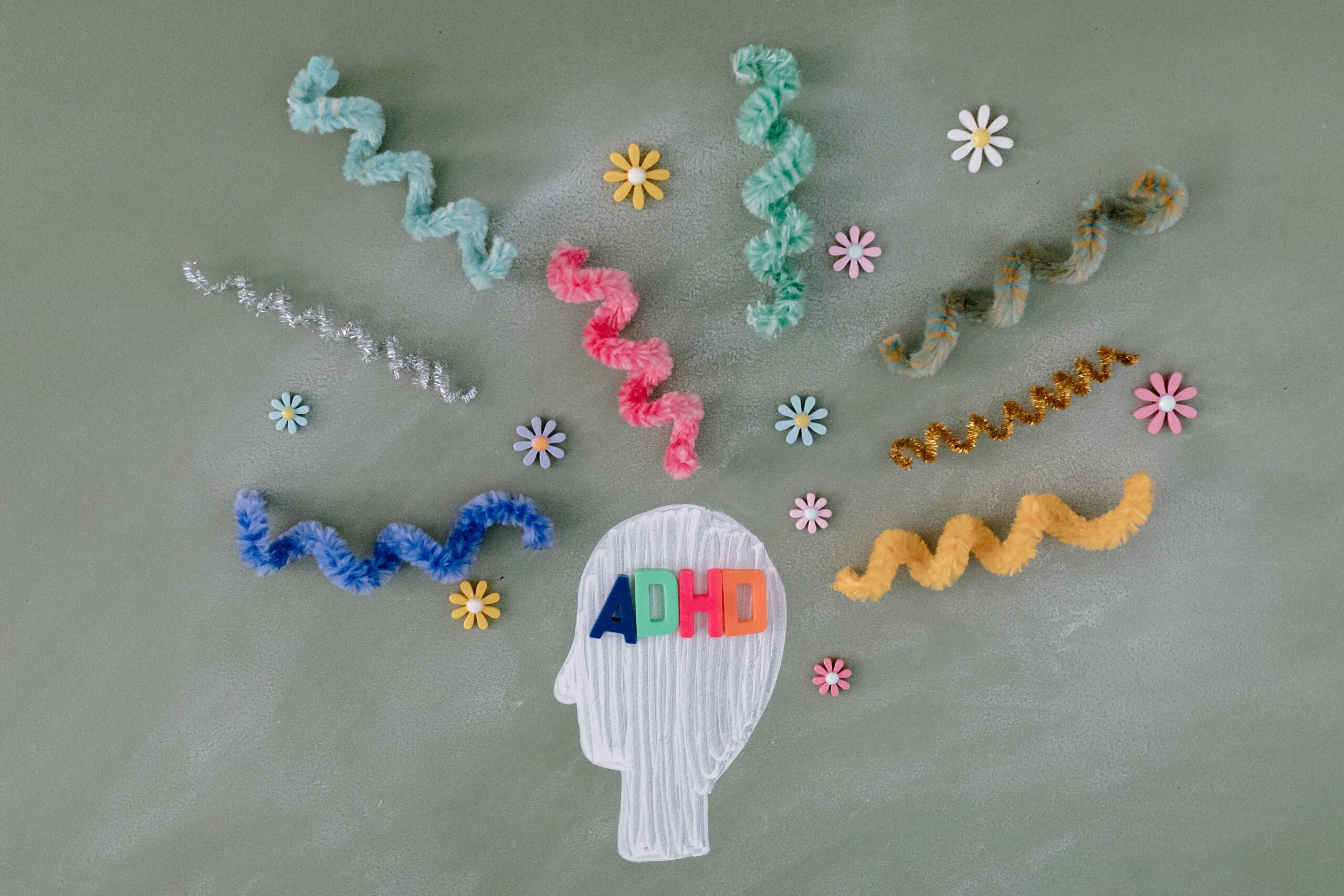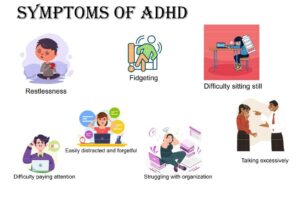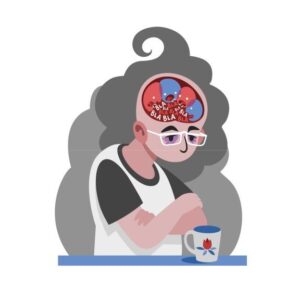Understanding ADHD
- Dr Owais Rafiq
- September 28, 2023
- 8:52 pm

We all want the best for our children. But what happens when our child’s behavior seems different from their peers? You may have heard of attention deficit hyperactivity disorder (ADHD), a condition that affects millions of children worldwide. In this article, we will take a closer look at ADHD, its various types, symptoms, and possible causes. By understanding this complex condition, you can better support your child and help them thrive.

What is ADHD?
ADHD is a neurodevelopmental disorder that affects children and can persist into adulthood. It is characterized by persistent patterns of inattention, hyperactivity, and impulsivity. Children with ADHD may struggle with focusing, following instructions, and controlling their impulses. It’s important to note that ADHD is not a result of bad parenting or a lack of discipline. It is a genuine neurobiological condition that requires understanding and support.
Unlocking the Mystery: What is ADHD?
ADHD, or Attention-Deficit/Hyperactivity Disorder, is often misunderstood. Many people think it only shows up as a kid bouncing off the walls, but there’s a lot more to it. Let’s break it down and explore what ADHD really is.
Understanding ADHD: More Than Just Being Hyper
ADHD is a disorder that affects how people pay attention and control their impulses. Imagine trying to watch a movie while someone keeps switching the channels. Frustrating, right? That’s kind of what it feels like for someone with ADHD when they’re trying to concentrate. It’s not just a childhood issue; ADHD can carry into adulthood too.
The Signs and Symptoms of ADHD
Recognizing the signs of ADHD can be tricky. It often shows up in different ways. Here are a few common symptoms:
- Inattention: This isn’t just about being forgetful. It can mean having a hard time focusing on tasks or making careless mistakes. Picture someone trying to read a book but getting distracted by every little noise.
- Hyperactivity: For some, it’s all about moving. Think of a pot of water boiling over. That’s the kind of energy some people with ADHD have. They might fidget, talk a lot, or feel restless.
- Impulsivity: This means acting without thinking. Imagine a kid who blurts out answers in class before the teacher finishes asking. It’s not about being rude; their brain just moves faster than their ability to stop and think.
Who Does ADHD Affect?
ADHD can impact anyone, regardless of age or background. The symptoms can show up in kids as young as five, but sometimes adults don’t realize they have it until they struggle in work or relationships. It’s like carrying a backpack full of rocks; you might not notice it at first, but it can weigh you down over time.
Why Does ADHD Happen?
The exact cause of ADHD isn’t fully known, but researchers think it might be a mix of genetics, brain structure, and environmental factors. For instance, kids with someone in their family with ADHD are more likely to have it too. It’s like a family recipe that gets passed down, but instead of cookies, it’s a different way of thinking.
How is ADHD Diagnosed?
Getting diagnosed with ADHD usually means visiting a healthcare professional who will do a thorough evaluation. They’ll ask questions about behavior, family history, and might use questionnaires. Just like diagnosing a car issue, it takes a careful look to find out what’s really going on.
Living with ADHD: The Daily Challenges
Navigating life with ADHD can sometimes feel like running up a hill with a backpack full of uneven rocks. Simple tasks can become complicated. For example, keeping a tidy room might seem like a mountain to climb. But many people with ADHD find ways to cope and thrive.
Treatment Options for ADHD
While there’s no cure for ADHD, there are many ways to manage it. Treatments can include:
- Medication: Some people find that medication helps them focus better. Think of it like putting on reading glasses; suddenly, everything becomes clearer.
- Therapy: Talking with a therapist can provide strategies for managing symptoms. It’s like having a guide on a tricky hiking trail.
- Support Groups: Connecting with others who understand the struggle can be comforting and empowering.
Conclusion: Embracing Differences
Living with ADHD can be tough, but it also comes with unique strengths. Many people with ADHD are incredibly creative and passionate. Understanding and accepting ADHD is the first step in making life easier for those who have it. So the next time you see someone struggling to focus, remember—they might just be running their own race, and that’s okay.

Types and Symptoms of ADHD
ADHD can be classified into three main types: predominantly inattentive, predominantly hyperactive-impulsive, and combined type. Let’s take a closer look at the symptoms associated with each type:
Predominantly Inattentive ADHD:
- Difficulty paying attention to details and making careless mistakes.
- Trouble toying focused on tasks or activities.
- Easily distracted and forgetful.
- Frequently losing or misplacing belongings.
- Struggling with organization and time management.

Predominantly Hyperactive-Impulsive ADHD:
- Excessive restlessness and fidgeting.
- Difficulty sitting still for extended periods.
- Talking excessively and interrupting others.
- Impulsive or risk-taking behavior without thinking about the consequences.
- Difficulty waiting for their turn in games or conversations

Combined ADHD:
A combination of both inattentive and hyperactive-impulsive symptoms.

Understanding the ADHD Brain
The ADHD brain functions differently from a neurotypical brain. Certain areas of the brain responsible for attention, impulse control, and executive functioning may be affected
There are certain chemicals called neurotransmitters, like dopamine and norepinephrine. These chemicals help our brain cells communicate with each other. Neurotransmitters are messengers in our brains, delivering important messages. But in ADHD, sometimes these messengers get a bit mixed up. That’s why children with ADHD may have trouble paying attention, staying focused, or controlling their impulses.

What Can Cause ADHD?
While the exact causes of ADHD are still being studied, research indicates that genetics play a significant role. If a parent or sibling has ADHD, the chances of a child developing it increase. Other factors, such as exposure to environmental toxins during pregnancy or premature birth, may also contribute to the development of ADHD. However, it’s important to note that parenting style or diet does not cause ADHD.
By gaining a deeper understanding of ADHD, parents can create a nurturing environment that supports their child’s specific needs. Early intervention, along with appropriate strategies, can help children with ADHD thrive academically, socially, and emotionally. Remember, every child is unique, and with the right support, your child can reach their full potential.
Understanding and Supporting Individuals with ADHD
- Educate yourself about ADHD to better understand and support individuals with the condition.
- Patience, empathy, and open communication are key when interacting with someone with ADHD.
- Provide a structured environment, and clear instructions, and break tasks into manageable steps.
- Implement accommodations at home, school, or work to support individuals with ADHD.
- Encourage self-care strategies, stress management techniques, and healthy lifestyle choices.

Wrap up
If you suspect your child may have ADHD, it is important to consult with a healthcare professional for a proper diagnosis. They can guide you in developing an appropriate treatment plan, which may include behavioral therapies and, in some cases, medication. Remember, having ADHD does not define your child’s future. With understanding, support, and the right strategies, they can lead fulfilling and successful lives. Together, let’s embrace our children’s differences and help them shine!
Disclaimer:
This blog provides general information and encourages seeking medical care for specific conditions. It is important to note that this information is not a substitute for medical advice, and we cannot be held responsible for any consequences.
Dr Owais Rafiq
Subscribe to Dr Owais YouTube channel
For parenting advice, child health, symptoms, causes and treatment of illness in children.







